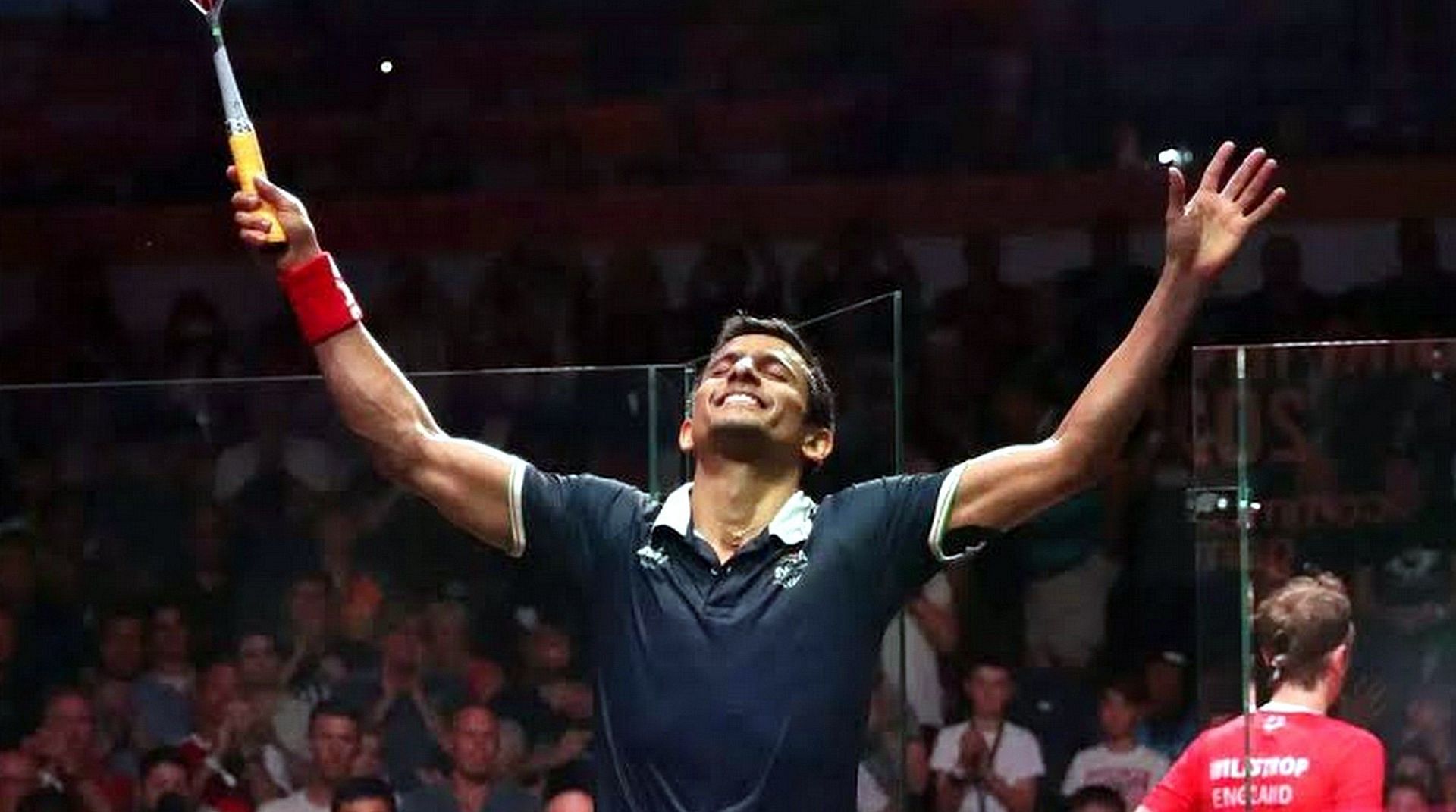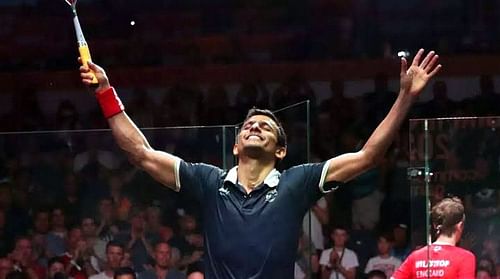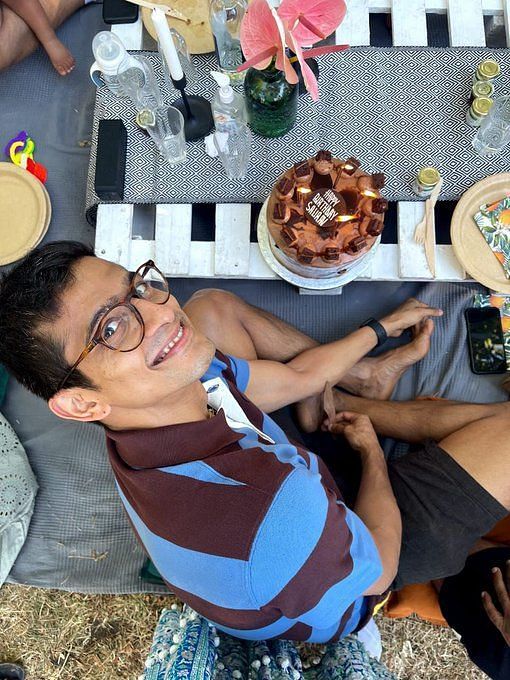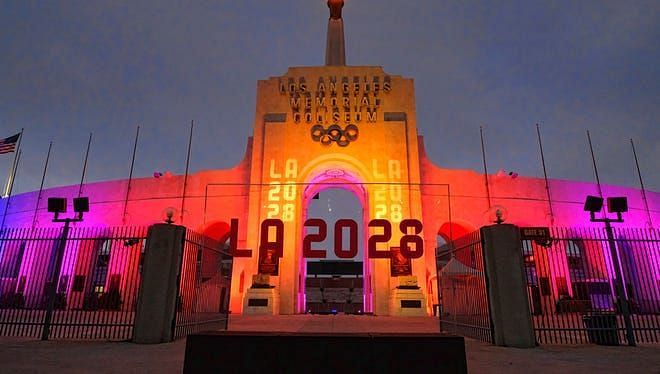
"Told myself on my birthday that I want to have a go again" - Indian squash stalwart Saurav Ghosal dismisses retirement rumours after winning historic CWG singles medal

Indian squash has seen massive growth over the past decade and at the forefront of this boom is the celebrated trio of Saurav Ghosal, Dipika Pallikal and Joshna Chinappa, who've won medals galore for their country at marquee international events.
As the nine-member Indian squash contingent headed to Birmingham for the recently concluded Commonwealth Games (CWG), there was only one question on everyone's mind - 'Can India finally bag the elusive CWG singles medal in squash?' Incidentally, no Indian squash player had been able to win a singles medal since the sport's introduction to the quadrennial event in 1998.
The jinx finally broke on August 3 when Ghosal, the poster-boy of Indian squash, beat England's James Willstrop 3-0 (11-6, 11-1, 11-4) in the bronze-medal play-off to claim the historic singles medal. As the scoreline demonstrates, Ghosal dominated throughout the match, winning a staggering 33 points out of 44.
The contest took a heavy toll on Ghosal both physically and mentally, for even a stoic person like him was seen in tears after putting down his racket. The Kolkata-born athlete went into the high-stakes clash having lost the semi-final 3-0 (11-9, 11-4, 11-1) to New Zealand's Paul Coll the previous day, and the fact that he overcame Willstrop's challenge to win the bronze made it even more special.
After all, the former CWG singles gold medalist is Ghosal's long-time friend, and his father Malcolm, who passed away last year, played a significant role in making Ghosal the player he is today. The podium finish also helped the India No. 1 find redemption after suffering a second-round exit in the previous edition of the Games at the Gold Coast in 2018.
Ghosal later teamed up with Dipika Pallikal to bag another bronze, this time in the mixed doubles. Touted as favorites to win gold post their mixed doubles title triumph at this year's WSF World Doubles Championships, the pair went down 2-0 (11-7, 11-4) to Coll and his compatriot Jollie King in the semi-finals. However, they came back stronger and outclassed the Australian pair of Donna Lobban and Cameron Pilley 2-0 (11-8, 11-4) to clinch their second CWG medal together after winning silver in 2018.
Ghosal's brimming trophy cabinet, which includes multiple CWG, Asian Games and World Doubles Championships medals, is a testament to his rich legacy. Has the 2022 CWG left him completely drained or infused him with fresh energy?
Shortly after celebrating his 36th birthday on August 10, the Indian squash stalwart spoke exclusively to Sportskeeda about his emotions after the historic bronze medal match, the sport's quest for a coveted Olympic berth, his future plans, and more.
Here are the excerpts:
Q: The CWG must have been a catharsis for you. How did you celebrate your 36th birthday and how have the past few days been?
Ghosal: The birthday was pretty cheerful. I was in London with my family. We had a nice lunch and a kind of picnic in Hyde Park. That evening, we watched a movie at home and chilled. I couldn’t have asked for a better celebration, especially after all the hectic days that went before it.
Q: How much did the preparatory camp with Gregory Gaultier in Chennai help the Indian squash contingent at the CWG?
Ghosal: Greg, with his vast experience, knows how to tackle big events like the Commonwealth Games, how to play against different players, and what needs to be done.
We’ve also played on the PSA tour together, so we share a great relationship. It was good to have him in the camp for two weeks. He not only helped me but everyone associated with the Indian team.
Chris Walker accompanying us to England as a consultant coach also proved fruitful. He was a top player during his playing career and you don’t get into the top half of the world without knowing what you’re doing. Overall, the preparations went very well for us as a team.
Q: A multi-sport event like the CWG is full of hustle and bustle. How do you insulate yourself from the hubbub?
Ghosal: I think the best thing for me is to create a routine where I am at. For instance, I created a routine at the Games Village in terms of my meals and training sessions.
As you said, it wasn’t easy, but I tried to remain calm throughout the day and not just when I went to the venue. I took my time to soak in the atmosphere and the magnitude of the event. I took it one day at a time and didn't try to look too far ahead. I think those small things helped me stay focused.
Q: You dominated the bronze medal match against former World No. 1 James Willstrop, who was also your training partner in the past. Talk us through your emotions after the match. Did you feel life came full circle since James’ father, the late Malcolm Willstrop, was your mentor?
Ghosal: Playing a bronze medal match in itself is very hard because you lost the previous day. I had to reset my head and tell myself that I had to give myself one more big push.
Then playing against James…Forget about my relationship with him; he’s a legend in his own right. On top of that, if you consider my relationship with him and the amount of things that I’ve learned from him and his father made it probably the hardest match I’ve had to play in my entire career. For the most part, Malcolm made me the player I am today.
I’m very proud that I produced my best performance of the Games on that day. Playing the way I did and executing the things that I set out to do made me quite happy. I was thinking of small, specific things.
I tried to focus my head on what needed to be done rather than thinking about the magnitude of it all and everything that was coming with it. It was very tough and I think the performance will always stay with me because it was so important for me and my country.
Q: What kind of reception did you get on returning to the Games Village? How long did it take you to realize the enormity of the achievement?
Ghosal: The whole thing took some time to sink in. I returned to the Village around 11 PM after the medal ceremony. We had the mixed doubles event starting the next day, so I mentally tried to switch off from the singles and focus on the mixed doubles as quickly as I could. My head didn’t have enough time to process everything that had gone by. I think I’m proud of the fact that I won this medal.
I’m still a bit sad that I couldn’t get through Paul Coll in the semis because I had prepared well and was playing really well. But Paul was very good in the tournament over those two weeks, so fair play to him. He deserved both those gold medals.
A lot of good things have come out in terms of the squash I played throughout the CWG. Hopefully, I can build on that and move forward with it in the next part of my career.
Q: Who was the first person you showed the medal to via video call?
Ghosal: I didn’t call anyone from the village; I called a few people from the venue. My dad and wife were in Birmingham, so that was good. I called up my grandmother, who lives in Kolkata, and my mom. I also called up my current coach David Palmer, who lives in the US, and my Philadelphia-based physical trainer Damon Brown.
Both of them have had a massive contribution to my success and I wouldn’t have been able to win the CWG bronze without them. I called up my mother-in-law as well. It was good to talk to them and tell them, "You know what? I’ve won this medal."
Q: You and Dipika Pallikal were considered favorites for the mixed doubles event at the Birmingham CWG, having won gold at the WSF World Doubles Championships earlier this year. Were you exhausted by the time you reached the mixed doubles semi-finals?
Ghosal: No, I don’t think so. I felt fine physically. Unfortunately, we didn’t have the best day [in the semi-final]. We had a plan going in, but we couldn’t execute it well enough. The Kiwis were very good on the day. We probably needed to play according to our backup plan after losing the first game. It struck us a little late and the match slipped away from us.
In a best-of-three games, once a match starts drifting away from you, it’s very difficult to pull it back. We had one bad day, which cost us the gold.
But then we did well to pull our socks up and come back the next day to beat the Australian pair against whom we lost four years back. We couldn’t produce the desired performance in the semis, but these things happen in sports. Even though you’re sad about it, you have to accept it and move forward.
Q: You were named the PSA Men’s president late last year. Do you want to be involved with squash administration in the long run, be it at SRFI or at PSA?
Ghosal: Ummm…I would like to be associated with the sport in some form. At the moment, I’m not sure about how I’m going to be associated, but I want to help kids who have talent and potential by giving them the right environment. Hopefully, I can produce more champions from India.
Q: What is your overall assessment of the Indian squash contingent’s performance at the 2022 CWG?
Ghosal: We could’ve won more medals. Personally speaking, the two bronze medals that I won could’ve been of different colors. Joshna had a shot at the singles. Unfortunately for her, Holly Norton had a great tournament and Joshna ended up losing to her. Joshna and Dipika also formed a strong pair in the women’s doubles, but things didn’t go as planned in their event. Those are the two other categories where we could’ve done better.
Ramit’s [Tandon] injury was a big blow for us. He was practicing with me and he got injured on the first day, which ruled him out of the entire Games. I think we could’ve won one or maybe two more medals. That said, the competition is huge at the CWG.
We haven’t returned empty-handed; I would say we’ve only gone halfway. The singles medal is obviously huge and we’ve won medals in the doubles before. It’s a ‘glass half-full’ kind of scenario. I wouldn't say it’s completely full because that would undermine the potential of this team.
Q: We’re talking so much about your singles medal because the CWG is the biggest multi-sport event for squash. Do you think it’s the watershed moment for Indian squash and will have a lasting impact?
Ghosal: I really hope so. I think when I won the individual medal at the 2006 Asian Games in Doha, it was the start of a new chapter for Indian squash. We’ve done extremely well since then.
16 years later, we’ve won our first CWG singles medal, so I’m really hopeful that it will have the same impact. I want to see more kids start playing squash and believe that India can do well on the world stage. Only time will tell if that really happens, but I do hope that this medal will have the same impact as the 2006 Asian Games medal.
Q: Squash is one of the nine sports that have been invited to make a presentation for inclusion in the 2028 Olympics. Could the breakthrough happen this time round?
Ghosal: As you said, the process has already started and squash is part of the process. The World Squash Federation (WSF), along with US Squash and PSA, will try their best to show the International Olympic Committee (IOC) that squash players deserve the Olympics as a platform to prove what they are all about.
Hopefully, the IOC will see that and we’ll be part of Los Angeles 2028. It’s a long process, so we’ve to abide by it and see where it takes us.
Q: You, Dipika and Joshna represent the golden generation of Indian squash. How do you think your legacy will be remembered?
Ghosal: The professional tour will resume soon, so I’m focusing on that. I want to do my best to push my ranking up and push the envelope on that front. The Asian Games, originally scheduled for this year, has been postponed to 2023. Hopefully, I'll be in good shape for the Asiad and do well for India.
I think Dipika has some calls to make. She has been doing quite well in doubles, but she now has to decide whether she wants to play singles again or not. She should sit down with herself and see if that’s something she’ll be interested in.
I think Joshna has goals that are similar to mine. She would probably want to focus on the PSA tour now and then have the Asian Games in mind to do well there.
In terms of the legacy…Look, I want to be the best version of myself and be the best player that I possibly can be. That’s a journey, a process, something that I work very hard for. I want to improve every day and produce some special performances along the way that can make me and my country proud. When I finish, only then can I look back at what legacy I’ve left.
I would like to think that Dipika, Joshna and I have done our bit to take Indian squash forward. Hopefully, we’ve been able to take Indian squash to a level where we are now considered genuine contenders for titles. By the time we finish, we would like to change the tag from contenders’ to actual winners.
Q: How do you feel being constantly asked about your retirement?
Ghosal: It’s actually funny, you know. As soon as the CWG finished, I was like, "Okay, it's such a big relief." (laughs) At that time, I was quite confused about my future. But on my birthday, I told myself, "You know what? I want to have a go again." I think the competitive spirit is still intact.
In terms of how long I would play, I sit with myself every year and see if I have the mental and the physical drive to keep going and compete at the very top. If the answer is yes, I do that. That’s what I’ve been doing ever since I turned 30 and that’s what I’ll continue doing.
As of now, I do want to play and still have the urge to improve every day. Thankfully, I still have the passion and intensity in me and hopefully, I’ll be able to win more and produce more special performances.

